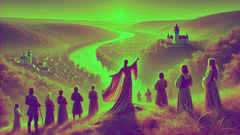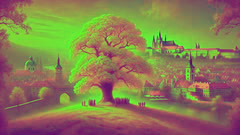Introduction
In the rolling heartland of ancient Bohemia, a mist often clung to the woods and meadows, shrouding the world in the ethereal hush of dawn. Here, where the Vltava River threaded its way through emerald forests, the land pulsed with legends older than memory. Among all the tales whispered around flickering fires and sung by wandering minstrels, none shaped the destiny of the Czech people so profoundly as the story of Princess Libuše. A woman of luminous wisdom and unyielding spirit, Libuše became not only a ruler but a beacon—a prophetess whose vision would birth a city and forge the soul of a nation. Her palace, set high above the river on Vyšehrad’s rocky promontory, overlooked a kingdom both wild and fertile, a place where myths intertwined with the roots of oak and linden trees. It was here, in a time when tribal councils and ancient rituals governed life, that Libuše’s voice echoed, gentle yet unwavering. She bore the legacy of her father, the wise chieftain Krok, and stood with her sisters, Kazi the healer and Teta the priestess. Yet, it was Libuše’s gift of foresight and fairness that drew the hearts of her people. She saw the patterns beneath the chaos, the shimmering threads of fate that others missed. In the restless gatherings beneath Vyšehrad’s ancient stones, chieftains and warriors knelt for her judgment, trusting her discernment over the clamor of ambition. Libuše could feel the pulse of the land, hear the secret songs of rivers and groves. And when the future seemed uncertain—when threats loomed or dreams flickered—her visions would guide her, shaping decisions not just for her tribe, but for all who called Bohemia home. Yet even the wisest ruler cannot escape the burdens of power. As her fame grew, so too did envy and doubt among those who could not fathom a woman at the helm of a nation. But Libuše’s story is not just of struggle; it is of a hope so radiant that it lingers in Prague’s golden rooftops and echoes in the laughter of its people. For in the days when Bohemia needed a promise, Princess Libuše gazed into the veiled future and saw the city that would rise from forested banks, a city destined to be beloved for centuries. This is her legend—a tale of vision, justice, and love, where every stone and shadow carries the memory of a woman whose dreams shaped the world.
The Wise Princess and Her Burden
Princess Libuše ruled from Vyšehrad, her palace perched like a watchful guardian above the restless flow of the Vltava. Her court was not grand by later standards—wooden halls decorated with carvings of wolves and stags, fragrant with burning herbs, filled with the warmth of communal fires and the laughter of kin. She lived among her people, as one of them but set apart by her insight and destiny. Libuše was the youngest daughter of Krok, the revered chieftain who united warring tribes under a banner of wisdom. Her sisters, Kazi the herbalist and Teta the keeper of ancient rites, each embodied a different face of Bohemia’s spirit, but it was Libuše’s clarity and sense of justice that made her father choose her as heir. The tribal council—a gathering of elders and warriors—had not expected a woman to rule. Yet they could not deny her fairness. When disputes arose over land, water, or honor, Libuše listened with an unhurried patience that seemed to slow time itself. Her voice was gentle but carried the unbreakable weight of law. The people loved her for it.

Her palace was open to all. Peasants with grievances, merchants with dreams, even rival chieftains hoping for arbitration—Libuše saw them all. She understood that the heart of the nation beat strongest when justice was done openly and without pride. In the evenings, after the last petitioner had gone, she’d walk among the sacred groves, her mind attuned to subtle signs: the cry of an owl, the rustle of a deer, the way the river changed its song. For Libuše, the land was alive, its secrets revealed not just in visions but in every living thing.
Yet peace was fragile. The tribes of Bohemia had only recently set aside old feuds. There were whispers among the council—restless voices questioning if a woman should command warriors or shape destinies. Some respected Libuše’s insight but feared that without a strong husband to wield a sword beside her, the kingdom would seem weak to jealous neighbors. Rumors took root like weeds. Tensions simmered in smoke-filled halls as proud warriors murmured about tradition, and ambitious nobles eyed the throne.
Still, Libuše would not be rushed. She believed in fate’s unfolding, in the wisdom of waiting for the right moment. Her visions grew stronger as the land’s troubles deepened. One night, after a storm swept through the valley, she dreamt of a city—vast and shining—rising from the forests beyond the river. Its spires caught the sun, its streets bustled with life, and the laughter of generations echoed in the air. The vision left her trembling with awe, but also with fear. Could her people see what she saw? Would they trust her enough to follow where her heart led?
As days passed, disputes grew more heated. One morning, a group of elders confronted Libuše in the great hall. They spoke respectfully but firmly: "A woman’s wisdom is a blessing," said the eldest, "but a nation must be led by a man in strength as well as mind. Choose a husband who can rule at your side."
Libuše’s reply was calm: "You seek strength for Bohemia, but what is strength? Is it only in the arm, or also in the spirit? I will marry, but not to satisfy ambition or pride. The land will show us whom I am to wed."
Her answer spread through the land like wildfire. Some feared for her; others admired her resolve. The council, desperate to resolve the uncertainty, demanded that Libuše name her future husband. She agreed, but only on one condition: that she be permitted to consult the spirits and the wisdom of the earth itself.
That night, under a sky scattered with stars, Libuše walked alone to the edge of Vyšehrad. She knelt in the grass, fingers tracing the dew, and called upon the ancestors. The wind shifted. A silver mist rose from the river. In her mind’s eye, she saw a vision: a simple ploughman, his hands stained with earth, his eyes bright with honesty, leading oxen along a field at the foot of a wooded hill. The land whispered his name—Premysl.
At dawn, she summoned the council. "Send your envoys," she said, "beyond the river, where a man ploughs his field at the foot of a hill. His name is Premysl, and he will be my husband—the father of a dynasty and the strength of our people."
The elders set out, guided by Libuše’s prophecy. In time, they found Premysl exactly as she’d seen: humble yet proud, wise in his own way, a man whose roots were sunk deep in Bohemian soil. When they brought him to Vyšehrad, Libuše welcomed him not only as a consort but as a partner, equal in spirit if not in vision.
Together, Libuše and Premysl ruled with a new harmony. Their union calmed old fears and set the foundation for a dynasty that would shape Czech lands for centuries. Yet for all her people’s gratitude, Libuše’s greatest vision was still to come—a prophecy that would change Bohemia forever.
The Prophecy of Prague
With Premysl at her side, Libuše’s reign flourished. Peace settled over the land, and the unity forged by their marriage seemed unbreakable. Yet Libuše’s mind often wandered to her vision—a city radiant with promise, born from the very heart of Bohemia. She felt the weight of it in every decision, every word spoken in Vyšehrad’s halls. The people, sensing her preoccupation, came to her seeking answers for their own dreams and fears. One day, a heated dispute erupted between two powerful families over the boundaries of their lands. Their quarrel threatened to splinter old alliances. Libuše listened patiently, her brow furrowed in thought. As they argued, a strange calm overtook her. The voices around her faded; the world narrowed to a single thread of possibility.

She rose, her presence commanding silence. “Bring me my white horse,” she said quietly. Attendants hurried to obey. Dressed in her ceremonial robe and bearing the staff of judgment, Libuše rode out from Vyšehrad, her people trailing behind in anxious curiosity. She led them across the Vltava, into dense woods where no settlement yet stood. The land was wild—thick with ancient trees, the air alive with birdsong and hidden life. At a clearing on a gentle slope above the river, Libuše stopped. Here, she dismounted and knelt in the grass. Closing her eyes, she pressed her palm to the earth. In her mind, she saw once more the city of her dreams: stone towers rising from wooded hills, red roofs gleaming in the sun, bridges arching gracefully over waters teeming with boats. A name resounded in her heart—Praha.
She turned to her people and spoke with certainty: “I see a city whose glory will touch the stars. Its fame will spread across the world. Here, on this spot, raise the threshold—praha—of your homes. One day this city will stand as a beacon for all who seek wisdom and justice.”
The people were awestruck. Warriors and chieftains bowed their heads, overcome by her conviction. Libuše’s vision gave them hope—a promise of a future greater than any could imagine. The site she chose would become the legendary Castle Hill, and soon workers began to clear trees and lay foundations. Word spread throughout Bohemia: Princess Libuše had foreseen a city that would outshine all others, a city born of prophecy and faith.
As the first timber walls rose on the hillside, settlers flocked to the new site. Craftsmen and traders built homes along winding lanes. The aroma of fresh bread and smoke from hearth fires mingled with the scent of pine. Children laughed as they chased each other through the half-built streets. At the highest point, work began on a great hall—a place that would become Prague Castle.
Libuše watched all this with quiet satisfaction. In her heart, she knew that Praha’s destiny was just beginning. The land itself seemed to bless the work: crops flourished in new fields, rivers ran clear, and even the animals were uncommonly bold. Elders told tales of omens—wild deer gathering at dusk, white doves circling the budding city.
But prophecy is never free from challenge. Neighboring tribes looked on with suspicion, fearful that Praha’s rise would threaten their own power. Jealousies simmered, and rival chieftains whispered of rebellion. Yet Libuše faced these threats with the same steadfast courage she’d always shown. She convened councils beneath the ancient linden trees, inviting all to speak their minds. Her words soothed old grudges and inspired new trust. She declared that Praha would be a city open to all—its gates welcoming strangers, its laws grounded in fairness.
Over time, Praha grew from a handful of timber houses to a bustling town. Merchants from distant lands arrived to trade furs, salt, and amber. Artisans adorned homes with intricate carvings. The city’s first temple rose on Castle Hill, its bells ringing out across the valley. Festivals filled the streets with music and color, drawing together people from every corner of Bohemia.
Through it all, Libuše remained Praha’s guiding spirit. Even as age silvered her hair, her eyes sparkled with undiminished vision. She would walk among the people, listening to their stories, offering advice with her signature gentleness. Children ran to greet her; elders offered blessings. Under her watchful gaze, Praha flourished—a living testament to her wisdom and hope.
Legacy of Wisdom: The Heart of Bohemia
Years passed, and Praha thrived beyond even Libuše’s boldest hopes. What began as a prophecy became reality—stone walls replaced wood, markets overflowed with goods from far-off lands, and new generations called the city home. Yet Libuše’s legacy was never simply one of buildings and streets. Her wisdom shaped the spirit of Bohemia itself—a spirit rooted in justice, hospitality, and an abiding love for the land.

As Queen and prophetess, Libuše fostered traditions that would last for centuries. Under her reign, the courts upheld fairness above privilege. Disputes were settled by careful listening and thoughtful compromise. The poor and vulnerable found refuge within Praha’s growing walls. Festivals celebrated the turning of seasons, blending ancient pagan rites with new customs inspired by her vision. Songs and stories honored not just war and conquest, but the quiet courage of peacemakers and dreamers.
Libuše’s relationship with Premysl deepened into one of mutual respect and partnership. He brought strength and pragmatic leadership; she brought insight and inspiration. Their children—both of flesh and spirit—carried forward a dynasty known as the Premyslids, whose descendants would rule Bohemia for generations. Each ruler looked to Libuše’s example in times of turmoil: seeking counsel from elders, valuing wisdom over impulse, and remembering that true power lies in service.
As Libuše aged, she withdrew more often into solitude, wandering Praha’s gardens and forests at dawn or dusk. She spoke less often of visions but listened ever more intently to the land’s subtle voice. Once, during a summer festival, she called together the people atop Castle Hill. “Remember,” she said, “that Praha’s strength lies not in its walls or wealth, but in the hearts of those who love it. Guard this spirit always—be just, be kind, and cherish each other as I have cherished you.”
When Libuše’s final day came, it was marked by gentle rain and a hush across the city. People gathered in silent gratitude beneath Vyšehrad’s ancient stones. Her body was laid to rest beneath a linden tree, its branches already heavy with fragrant blossoms. The scent filled the air, mingling with memories of her laughter and wisdom. A soft wind stirred the leaves—a sign, many believed, that her spirit would never leave Bohemia.
In the years after her passing, legends grew around Libuše’s name. Some said she still walked among the forests at dusk, guiding lost travelers or whispering advice to troubled rulers. Others claimed that every just decision in Prague was touched by her unseen hand. The city itself became her monument: its bridges arching over the river like arms reaching toward the future; its towers watching over the people she loved.
To this day, Prague remains a city of stories—a place where past and present mingle beneath the linden and oak. The legend of Princess Libuše endures not only in monuments and festivals but in the spirit of those who call this city home. Her prophecy, spoken centuries ago on a sunlit hilltop, continues to inspire all who seek wisdom and hope in the heart of Bohemia.
Conclusion
Princess Libuše’s story endures as more than legend—it is the living foundation of Prague’s identity and a testament to the power of vision guided by wisdom and compassion. Her prophecy did more than foretell stone walls or bustling streets; it offered a promise that justice, unity, and hope could shape a nation from humble beginnings. Through times of peace and turmoil, her example inspired generations to seek counsel from both heart and earth, to cherish fairness over pride, and to look beyond the present toward a future filled with possibility. Today, as Prague’s spires shimmer against the sky and laughter fills its ancient squares, the spirit of Libuše still lingers—reminding all who walk these storied streets that true greatness begins with a dream and the courage to make it real.













